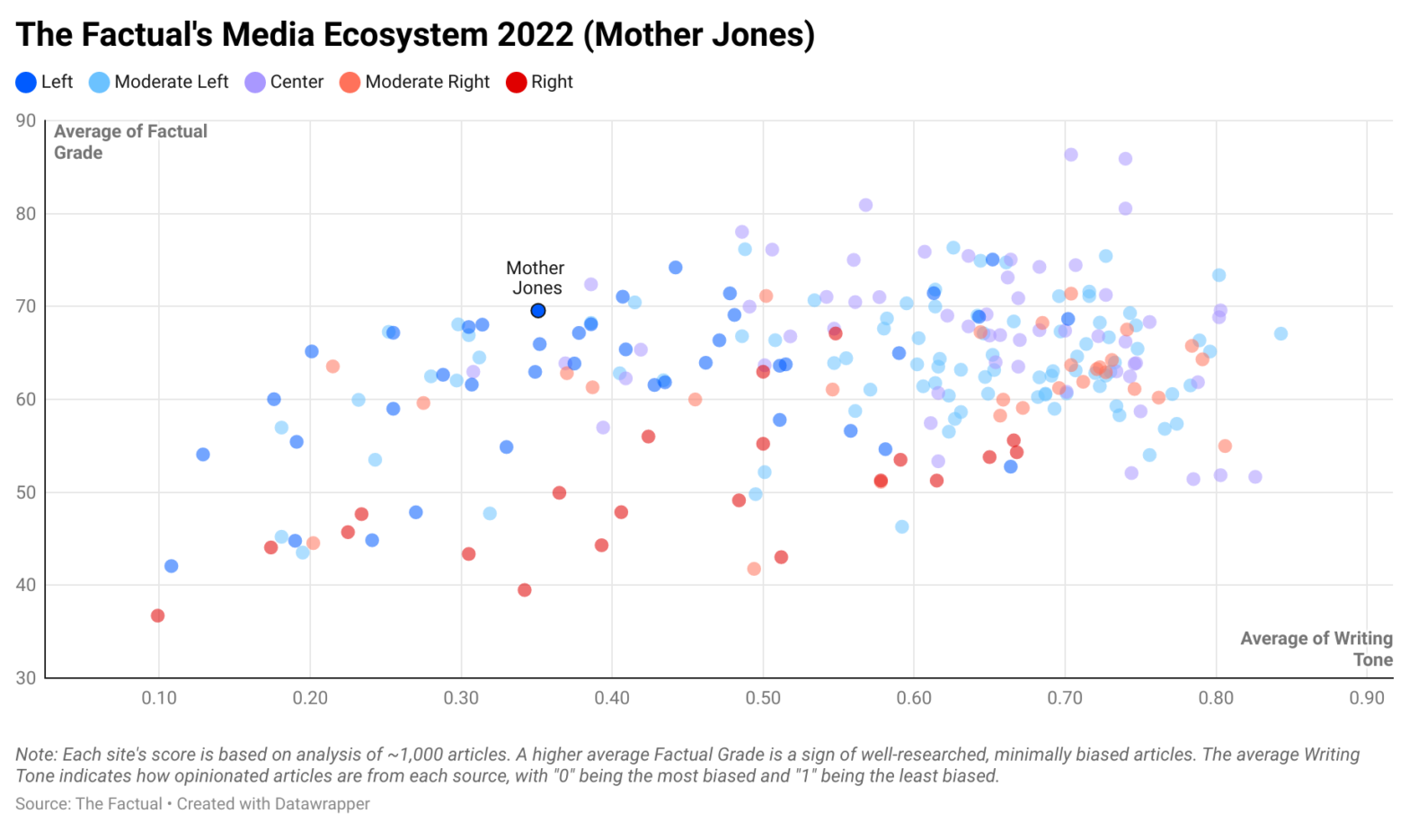Mother Jones was founded as a magazine for investigative journalism in 1976, named for trade union activist Mary Harris Jones, a key opponent of child labor. Since its founding, the publication has been widely received as progressive and liberal, though the it insists that its only bias is for the truth. So, how biased and reliable of a news source is Mother Jones?
How Does The Factual Rate News Sources?
The Factual analyzes more than 10,000 news stories every day to help readers find the most informative, least-biased articles. Our news-rating algorithm scores each article along four metrics: (1) cited sources and quotes, (2) publication history, (3) writing tone, and (4) author expertise. These scores combine in a weighted average we call a Factual Grade, which ranges from 0–100%. (See our How It Works page to learn more about our algorithm.)
For this study, we analyzed ~1,000 articles each from 240 news sources. The average Factual Grade for the entire dataset was 62.5%. Based on these averages, we can compare the performance of news sites across the media ecosystem. The entire dataset can be explored in greater detail here.
How Factual Is Mother Jones?
Mother Jones scored an average Factual Grade of 69.6%, placing it in the 82nd percentile of our dataset. Several factors contribute to these high scores, including high standards of author expertise and cited evidence. For example, articles from Mother Jones tend to be written by authors with strong topical expertise. This suggests that authors routinely cover the same subject for the site, delivering informed context and reporting. Likewise, articles from the site provide ample sourcing in the form of links and direct quotes. However, these otherwise high scores are pulled downward by highly opinionated language in some articles (more details below).
Like any news source, scores for Mother Jones varied widely based on factors like author expertise and cited evidence. For example, some scored above 80%, while others scored below 60%.
Please check your email for instructions to ensure that the newsletter arrives in your inbox tomorrow.
How Opinionated Is Mother Jones?
One of the metrics The Factual uses is the Writing Tone, which measures how opinionated the writing is in an article. For this metric, the algorithm looks for signs of subjective commentary (e.g., first person pronouns and unnecessary adverbs), as well as the emotional nature of selected words, and sees how prevalent they are for a given length of text. More neutral text receives higher ratings, with “0” being the most opinionated and “1” being the most neutral.
Mother Jones had an average Writing Tone score of 0.35, placing it in the 16th percentile in our dataset for this metric. This suggests that articles from the site are often highly opinionated and use biased or loaded language, indicating that articles are at times written to elicit an emotional response from the reader. This can be seen in articles headlines such as “Joe Manchin is officially the least likable person this year” and “Britain tells its big game hunters to piss off.”
What Is the Political Bias of Mother Jones?
The Factual classifies news sites by political bias as either Left, Moderate Left, Center, Moderate Right, or Right. This classification comes from third-party assessments from media bias organizations such as AllSides and Media Bias/Fact Check. Based on this data, The Factual assigns Mother Jones a “Left” bias.
AllSides classifies Mother Jones as “Left” based on an independent review and 18,633 community ratings. Over three-quarters of those respondents classify the site as having a “Left” bias. AllSides notes that Mother Jones is commonly referred to as liberal, so much so that the site’s FAQ addresses the issue: “Our bias is for the truth, for fairness and justice, for a democracy in which facts matter and all can participate.”
Media Bias/Fact Check (MBFC) classifies Mother Jones as “Left-Center” due to “story selection that moderately favors the left.” The site also receives credit for highly factual reporting and a clean fact-check record. Though Mother Jones has a reputation for favoring left-leaning causes, the site at times publishes content that is favorable of Republicans (“This Deep-Red State Decided to Make a Serious Investment in Preschools. It’s Paying Off Big-Time.”) as well as content that is critical of Democrats (“Why Are Biden’s Spokespeople Being All Authoritarian?”).
Please check your email for instructions to ensure that the newsletter arrives in your inbox tomorrow.
Who Owns Mother Jones?
The non-profit Foundation for National Progress owns Mother Jones. The site derives its funding from donations, subscriptions, advertisements, and institutional grants, including from the MacArthur Foundation, which has contributed over $2 million since 1998. Mother Jones claims that the current ownership structure, with funding coming primarily from readers and donors, allows for editorial independence, stating “we don’t report to any stockholders, owners, or corporate conglomerates.”
Why Does It Matter?
News articles always have some bias because all authors have some frame of reference within which they describe a story. Political bias ratings are helpful in understanding this framing. However, it can be more beneficial to know how factual an article is based on quantifiable metrics that can be seen across the media ecosystem, such as cited evidence, author expertise, and writing tone. This is what The Factual ascertains.
Reading several, highly rated articles from across the political spectrum helps counter the bias of any news source or story. To have the day’s most factual news stories delivered to your inbox every morning, subscribe to our daily newsletter.
Article updated on September 19, 2022 to reflect new data.

